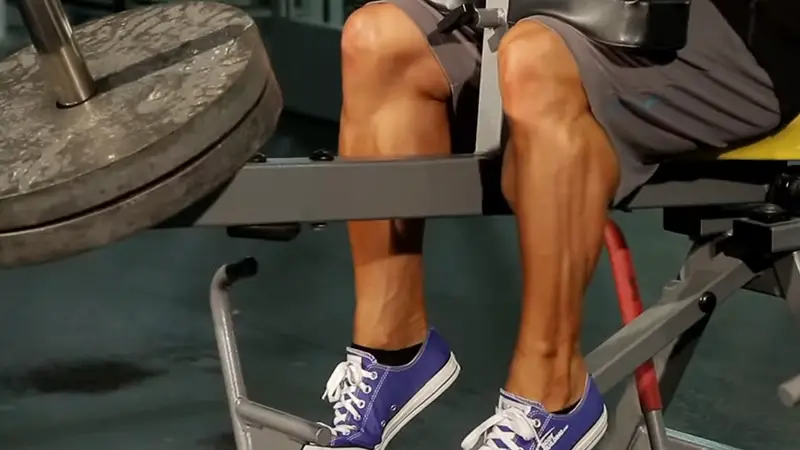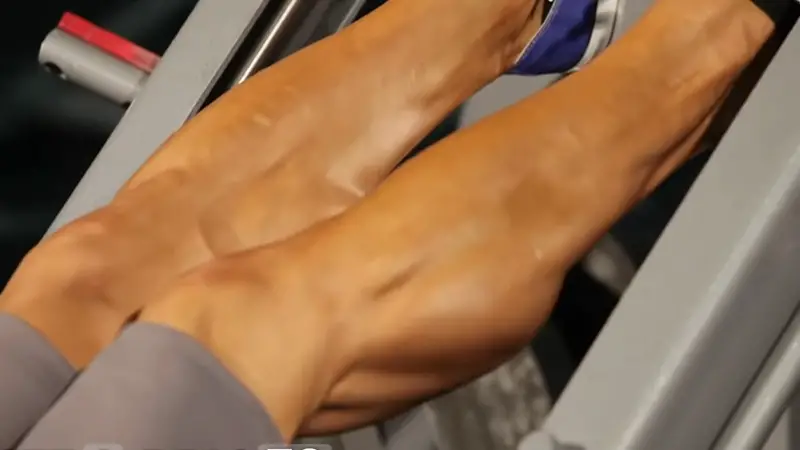Filipinos have big calves because they drink a lot of milk – this is due to the climate in which they live; it promotes fat storage and Milk is one of the main factors that leads to bigger calves.
Filipino people are known for their big calves, even though some cultures consider them unattractive – this has something to do with genetics and how much milk Filipinos consume. Even though there are many other things you could be doing with your time, if you’re a Filipino person chances are you’ll be bragging about your huge calf at least once.
If you want larger calf muscles then make sure to get plenty of good quality dairy products into your diet every day – whether that’s fresh whole milk or cheese. And lastly, don’t forget the importance of exercise… it definitely doesn’t hurt.
Why Do Filipino Have Big Calves?
Filipinos have big calves because they drink a lot of milk. The climate in which Filipinos live promotes fat storage and this is why the average Filipino has bigger calves than someone living elsewhere.
Milk is one of the main factors that leads to bigger calves and it’s something that Filipinos are especially known for around the world. Filipino people are known for their big calves, even though it might not be as common in other countries where calf size isn’t so prized or emphasized as it is in Philippines culture
Filipinos Have Big Calves Because They Drink a Lot of Milk
Drinking a lot of milk is one reason why Filipinos have big calves. Another reason is that Filipino women often wear high-heeled shoes, which puts more stress on the calf muscles.
Milk consumption has also been linked to a lower incidence of Diabetes and heart disease in Filipino people. Many Filipinos believe that having big calves indicates good health and prosperity.
As a result, many rural families continue to drink milk even though it might not be healthy for them long-term
The Climate in Which Filipinos Live Promotes Fat Storage
Filipinos have big calves because the climate in which they live promotes fat storage. Calves are especially susceptible to fatty tissue growth and accumulation during periods of high humidity and temperature, as well as a lack of physical activity or sunlight exposure.
The extra weight can help protect infants from injury and improve dairy production for farmers in the Philippines, where over 60% of people rely on agriculture for their livelihoods. The conditions that promote calf development also lead to increased risks for diabetes, heart disease, stroke, cancer and other chronic illnesses in adults..
Although obesity is now endemic throughout much of the world, it is particularly rampant in countries with tropical climates like the Philippines
Milk Is One of the Main Factors That Leads to Bigger Calves
Calves are a result of the cows’ natural diet, which includes high levels of milk. Milk production is also affected by genetics and environmental factors like climate and altitude.
The ideal calf weight is around 80 to 100 pounds at birth, but this can vary depending on the breed of cow and feed given to them during their lactation period (milk giving phase). Some calves may grow even larger if they consume large quantities of milk or receive supplements such as protein-rich formulas or grasses in their diets.
Cows that produce more milk tend to have bigger calves because it provides them with enough nutrition for growth and development.
Filipino People Are Known for Their Big Calves
Filipino people are known for their big calves because of the traditional way they work out – as farmers and in other physically demanding professions. Some believe that this trait is passed down from the ancestors, while others say it’s due to a combination of genetics and diet.
Whatever the reason may be, it has made Filipinos some of the biggest calf-holders around. If you’re ever lucky enough to see one in person, don’t forget to take a picture. What do you think? Is there anything else about Filipino people that makes them stand out? Let us know in the comments below.
Why Do Some People Have Very Large Calves?
Some people have very large calves because of their genetics. Too much salt can cause excessive body fat on your calf muscles, and this can lead to larger calf size.

If you’re not working out the right way for your body type, then you might also see an increase in your calf size as well due to excess body fat accumulation which you need to reduce. Finally, if you’ve been eating too many high-fat foods or drinking too much alcohol, these habits will likely contribute to having larger calves as well.
Do Big Calves Mean Good Genetics?
This is a question that many people ask themselves, and the answer isn’t always clear. Some people believe that having big calves means you have good genetics, while others believe it’s just a result of hard work.
Ultimately, it depends on your individual body build and how much muscle you’re packing on your calf muscles.
Genetics Do Play a Role
While calf size does play a role in how big they will become, there is still the possibility of growth even if you are not born with huge calves.
Training can help achieve maximum calf gains and proper diet plays a vital role in how much your calves grow. The amount of time you spend on them matters, too. Spending adequate time training your calves will ensure that they develop at their fullest potential.
What Do High Calves Mean?
Calves are a sign that you have good health, and they tell your doctor a lot about your overall fitness level. If you work out regularly but don’t have long calves, then there may be another issue going on in your life that needs to be addressed first.
A well-balanced diet will help ensure that your blood sugar levels and Achilles tendon are both normal, as well as give you the protein and fiber needed for healthy muscle growth. Getting enough sleep is also important for keeping your blood sugar levels balanced and avoiding any issues with the Achilles tendon or other muscles in your body.
Finally, if you notice anything unusual about your calves – like they’re unusually short – it might be time to see a physician for further evaluation
What Causes Thick Calves?
There is no one answer to the question of what causes thick calves. However, there are a few things that can contribute to them. For example, if you have obesity or diabetes, those conditions can lead to calf enlargement and difficulty exercising.

Additionally, some medications – like steroids – can also cause thick calves.
- One of the most common causes of thick calves is exercise, especially walking or running in high heels. When you increase your activity level, your calf muscles will have to work harder and this can result in them getting thicker over time.
- Another cause of thick calves is a build-up of fatty tissue inside the muscle cells. This type of tissue doesn’t use energy efficiently and can lead to a bunching up of the muscle fibers.
- Straining your calf muscles also plays a role in causing them to get thicker – when you lift weights, for example, you are putting more strain on these muscles than usual and this may be enough to cause them to thicken up over time.
- Finally, some people may develop thick calves as a result of increased strain on their calf muscles from straining during activities like stair climbing or weightlifting sessions.
Do Big Calves Make You Slower?
There is no scientific evidence that says having big calves makes you slower. However, some people believe this to be the case because they see it as a sign of strength and power.
Others simply find it aesthetically pleasing.
Having Big Calves Can Hinder Running Speed
Having more weight below the knee and towards the ankle increases the lower leg lever and slows leg turnover, which can all collectively decrease your running speed.
This is especially true for athletes who rely on their legs to move quickly. The larger calf muscles also take up more space in the running gait cycle, which can slow you down overall.
Larger Calves Slow Down Runners by Increasing the Lower Leg Lever
Larger calves have a greater ability to produce power than smaller ones, and this power is translated into increased foot speed when it comes to moving through air resistance during running. Additionally, having a higher lower leg lever means that runners are able to turn their feet over faster – but this comes at a cost of slower speeds overall due to increased ground contact time.
Having More Weight Below The Knee And Towards The Ankle Increases Lower Leg Lever And Slows Leg Turnover.
Large calves increase your chances of having a slower turn-over rate because they tend to weigh more towards the ankle area – making them harder for your runner’s glutes (butt) musculature to push off of as they initiate movement forward in order not only change direction but start accelerating again too.
Will Running Make My Calves Smaller?
Running, walking or swimming can help your calves to become smaller if you do them regularly. Strength training and biking should be avoided if you want to reduce the size of your calf muscles.
Aerobic exercise such as running, walking or swimming is more effective than strength training in terms of reducing calf size overall. It takes time for regular aerobic exercise to result in a decrease in calf muscle size – so be patient.
Remember that all types of exercise are important for overall health and fitness – mix it up to see results
To Recap
There are a few factors that may contribute to Filipino having big calves, including genetics and diet. However, there is no one definitive answer as to why this occurs.
There are many different types of cattle in the world and each has its own unique characteristics which can influence calf size. Some things that might affect Filipino calves include climate conditions, grazing habits, feed ingredients, and more.
I am a fitness instructor and I have been in the industry for 9 years. I have a passion for health and fitness.
I am a fitness instructor with over 9 years of experience in the industry. My passion is health and fitness and I would love to share my knowledge with you!